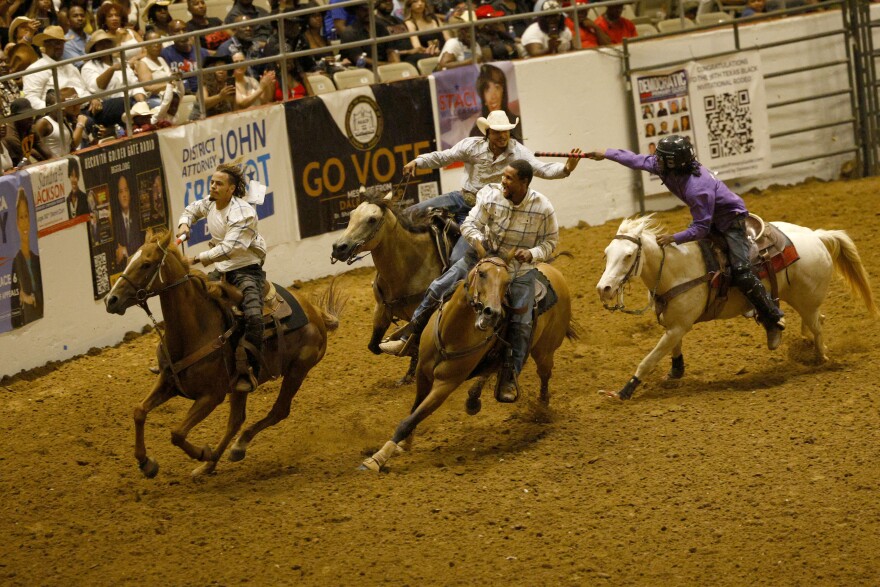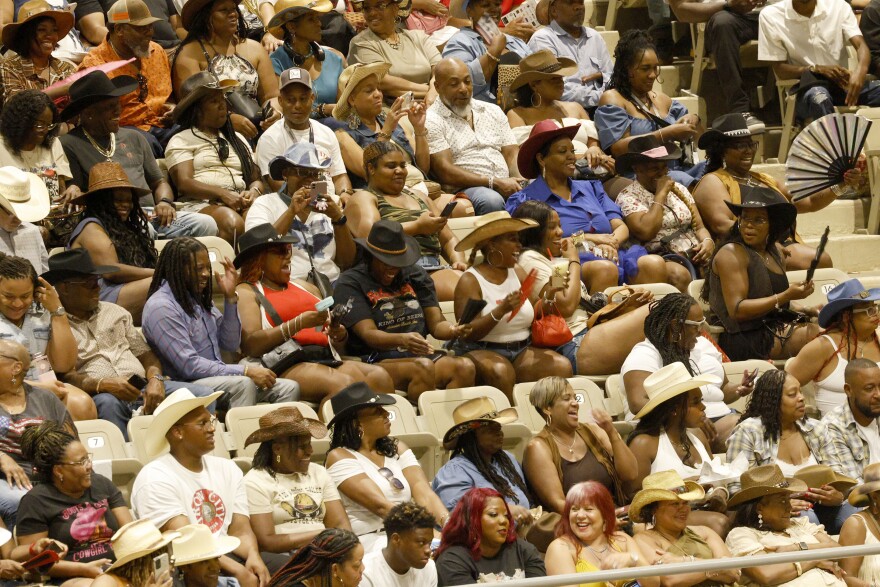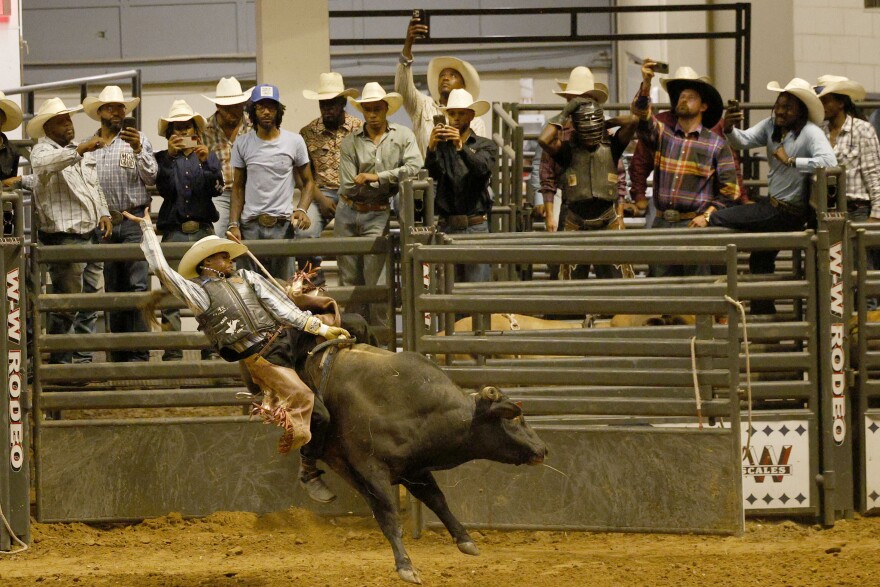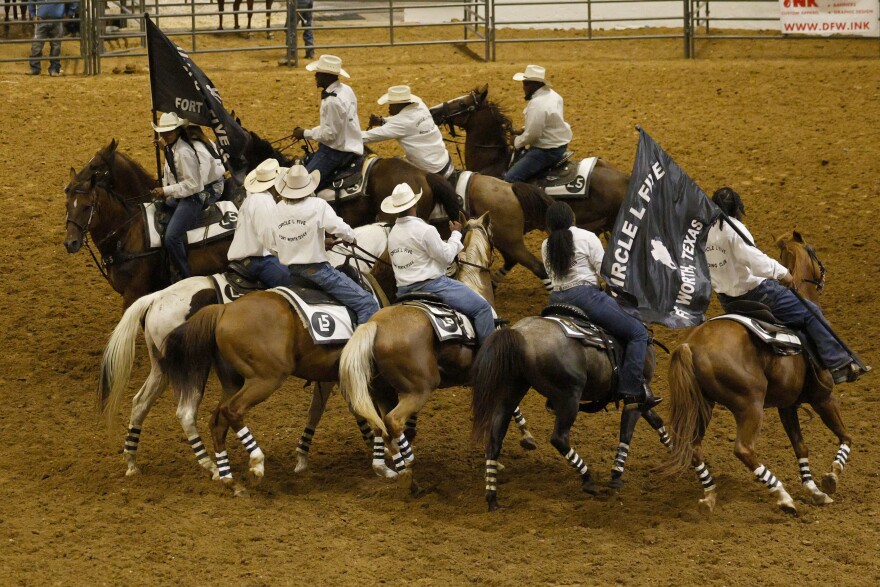Lesa Ellinger blasted out of a metal gate, riding a sleek cross between a thoroughbred and a quarter horse. Her white embroidered button-up flapped in the wind as she rode in formation with her fellow drill team members, guiding her horse in perfect sync around the arena. The crowd admired with awe.
“I've always wanted to ride horses. I think I came out wanting to ride horses,” she said.
This summer marks Ellinger’s fifth time performing in the Texas Black Invitational Rodeo, which takes place at Fair Park in South Dallas each year. She’s been riding for Circle L5 Riding Club, a Black horseback riding club, since 1991.
“It still gets me nervous, and I've been doing it for a while, but I still get nervous about it,” she said.

Ellinger dreamed of riding since she was a little girl growing up in New York. Despite having no background in equestrian sports, she started training in dressage competitions at 12 years old. When her parents moved to Texas in 1989, she agreed to move on one condition – they would buy her a horse.
In Southlake, Ellinger found new freedom and community. Owning her own horse meant she could compete as she pleased, and her search for a riding club introduced her to a new world of Black riders. Up North, she was used to seeing predominantly white horse riders, so joining Circle L5 was an exciting change.
“It was something that I felt comfortable to kind of know what my people are doing and kind of see how they interacted with horses just the same,” she said.
Each year, the Black Invitational Rodeo brings together riders like Ellinger from across the country to compete for cash prizes in bronc and bull riding, calf and steer roping, barrel racing and Pony Express relay. Now in its 36th year, the rodeo celebrates the legacy of Black cowboys and cowgirls with a night of family-friendly fun and competition.
But beyond the fun, the event serves a deeper mission.
Launched in 1985 by African American Museum founder Harry Robinson Jr. as a fundraiser, the rodeo highlights the overlooked history of Black cowboys in American culture.
“It gives us a chance to remind Texans and the rest of the world that the Western front was blazed by African American horsemen and cowgirls,” said Margie Reese, interim executive director of the African American Museum in Dallas.
Robinson partnered with rodeo legend Cleo Hearn to bring the event to life. Hearn is one of the first Black cowboys to compete professionally in major rodeos across North America and traveled all over the region with his wife and four sons before founding his own rodeo company, Cowboys of Color Rodeo.
That first year was a gamble. Hearn and Robinson rented out only half of the coliseum because they were unsure about how many people would show up. The original event featured only bronc and bull riding and calf roping. They ended up with a packed house of over 500 attendees.

Decades later, the Black Invitational Rodeo has grown into the museum's largest annual fundraiser, attracting about 7,000 attendees and 150 competitors.
“I think that now more than ever, young people want to see what we've talked about,” Reese said. “They want to learn and stand on the shoulders of those men and women who have blazed the trail for our own culture, but also for this country.”
And now it’s Cleo’s sons — Harlan, Eldon, Robby and Wendell Hearn, the rodeo manager — who run the show.
Wendell understands that their event might be the first time someone hears about Black cowboys.
“You get people that move in from California, from Detroit, from Chicago, from New York,” he said. “All of a sudden, when they move here … they're like, I've never seen a Black cowboy.”
That awe and excitement is what brought Leah Frazier to the rodeo this year for the first time.

“We have so many historical legends here in Dallas that are actually taking Dallasites to other Black rodeos in other states, and so I want to just be a part of that whole movement,” she said.
For faithful attendees like Hubert Ransom, seeing the arena filled with more young people each year is just as exciting as the calf roping.
“You get to see the cowboys and cowgirls show their talent and plus, you get people here to represent, to come out and see them as spectators,” he said. “It's good for everybody, the participants and the fans.”
Each summer, the people in the stands remind the Hearn family this isn't just a rodeo, it’s an act of preservation. Plus, the competitors have formed a tight-knit community. Hearn said he’s dedicated to continuing the legacy.
“The history of the Black cowboys is etched in American history,” Wendell Hearn said. “But if we don't tell it, what will happen? It'll easily fade away, and you're waiting on the next group to tell it. So somebody's got to keep the story going.”
Arts Access is an arts journalism collaboration powered by The Dallas Morning News and KERA.
This community-funded journalism initiative is funded by the Better Together Fund, Carol & Don Glendenning, City of Dallas OAC, The University of Texas at Dallas, Communities Foundation of Texas, The Dallas Foundation, Eugene McDermott Foundation, James & Gayle Halperin Foundation, Jennifer & Peter Altabef and The Meadows Foundation. The News and KERA retain full editorial control of Arts Access’ journalism.






